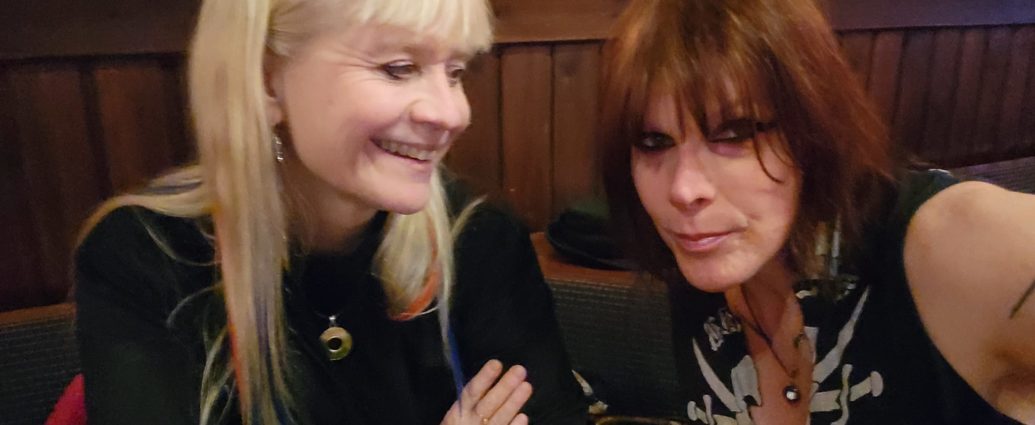How a “trans-glam-punk-rock story” is helping write history–and an example of commitment through the ups and downs of a marriage.
WORDS BY KATIE DOHMAN
Lynette Reini-Grandell was not used to pledging to write 1,500 words a day or writing chronologically. She’s a poet with punk roots who’s been nominated for a Pushcart Prize, an English professor at Normandale, a musician. Her process tends to be, shall we say, a bit more bohemian, writing when the spirit moves her.
She’s also married to Venus de Mars, who famously transitioned in the local rock scene throughout the ’90s and into the early aughts while fronting the thrilling rock outfit All the Pretty Horses.
But people wanted to know her story—what is and was it like to be married to a person who transitioned? The “I dos” had been said, but under different circumstances, after all. Reini-Grandell wasn’t so sure she needed to tell that story, especially because de Mars had been putting together the beginnings of her own memoir. But at a friend’s insistence—and in reaction to the 2016 election—Reini-Grandell decided it was time to tell their story from her perspective.
“[By 2016], everything had started to change. I thought, ‘My God, I have to write this down, because we might end up being completely obliterated and have to go back underground again,’” she says. “I gotta tell the history of when Venus started coming out to me and everybody else and what that moment was like and how it changed over the years.”
Still, reopening the wounds, digging into their history, using Venus’ name at birth and photos prior to her transition—all of it—was a delicate undertaking.
“The idea of each of us having our own voice in history became important,” de Mars agrees. “I recognized Lynette needed to write our history from her perspective.” As de Mars read the work, it reopened some old arguments and clarifications for issues they didn’t have words or clarity for at the time—“That was unpleasant,” Reini-Grandell acknowledges—but de Mars says it was worth it, in service to history.
“Lynette’s story is so important … her perspective and experience is just not out there at all,” de Mars says. “She is very much the vanguard of the voice of the spouse of a trans person, and what it’s like making that change and facing that challenge socially and personally. I supported it all the way. I was willing to let my story, the intimate things I had to deal with, be part of her book. I was willing to do that because I do feel it’s such an important piece of work.”
What emerged was Wild Things: A Trans-Glam Punk Rock Love Story, a tender, thoughtful, and unflinching examination of a marriage, of two people fighting for and choosing each other against the odds.
It was a long process: First Venus began dressing in women’s clothes for shows, which Reini-Grandell writes that she saw as part of the art. Then de Mars slowly moved to using her stage name when she realized moving about in the world as Venus felt freeing, even as it introduced more complications.
“When I would come back home and be in our relationship or Lynette would join me in the music world, there was an awkwardness,” de Mars says of the transition from her original name to her stage name. “It started to cause conflict. But I didn’t know what to do! I didn’t feel empowered. Our community was not at that place, especially around pronouns or name use. There was no community, really. But I did feel it on stage when I could be in music and screaming my head off with songs. That built a foundation for me to move forward and survive the sense of being an outcast and the oppression that I experienced during the day. It was a long process, and long process for us together in a relationship. Neither of us understood what was happening and had to try to figure it out.”
Reini-Grandell could feel the distance and darkness as her partner struggled but also didn’t have the language or the support—just the desire to stay together. The pair even separated for a time, not so much due to the transition, but as de Mars strove for rock’n’roll success and the financial struggle that entailed. Still, de Mars says, even when she was angry, Lynette was the one who stayed interested and engaged at a depth no one else did or could reach. Reini-Grandell says she stayed too fundamentally intellectually interested and enjoyed de Mars’ company too much to let go. In de Mars’ opinion, that’s the tie that bound.
“Sometimes I’ve wondered if Venus and I were in high school today … would I still have been interested in dating Venus? And you know, it’s possible. I was always attracted to people who were unique. I have trouble identifying as a lesbian—that’s not the right label—but I’m definitely in a lesbian relationship,” she says, acknowledging she feels a part of the queer community. Not unlike needing to use outdated terms and concepts to illustrate the history of their relationship and the trans and queer community in the book, there is still a language to be developed around expanding definitions of current queer life. “I have trouble filling out demographic surveys,” Reini-Grandell says. “Once, I selected ‘none of the above’ for the label, and then it prompted another dropdown, and I thought ‘I can’t get rid of this thing!’ We jokingly have used the word ‘transbian’ for me. Maybe it will stick. I’ll wait for it to appear on a demographic form.”
Reini-Grandell says that though her book illustrates a life with a trans partner, it’s a love story, a marriage story, that transcends identity. It’s a deeply human story. Her book and de Mars’ music is part of a persistent fight for all humans to have the safety, security, and livelihoods they deserve.
“Venus’s life has led me to all kinds of places I never thought I’d see,” she says. De Mars adds: “We need to become our true selves.”
WHEN YOU GO
Book signing with Lynette Reini-Grandell
June 25, 2-3 PM
Minnesota Historical Society Press booth from at Pride, Loring Park, Mpls

